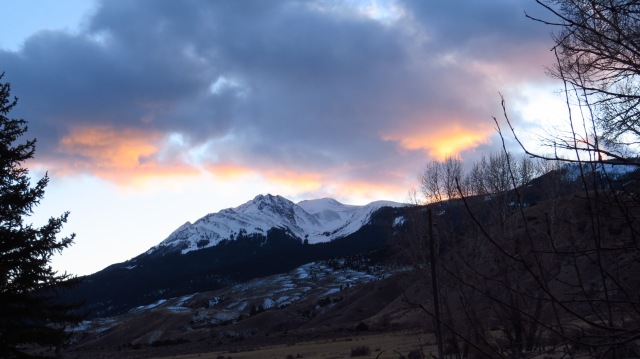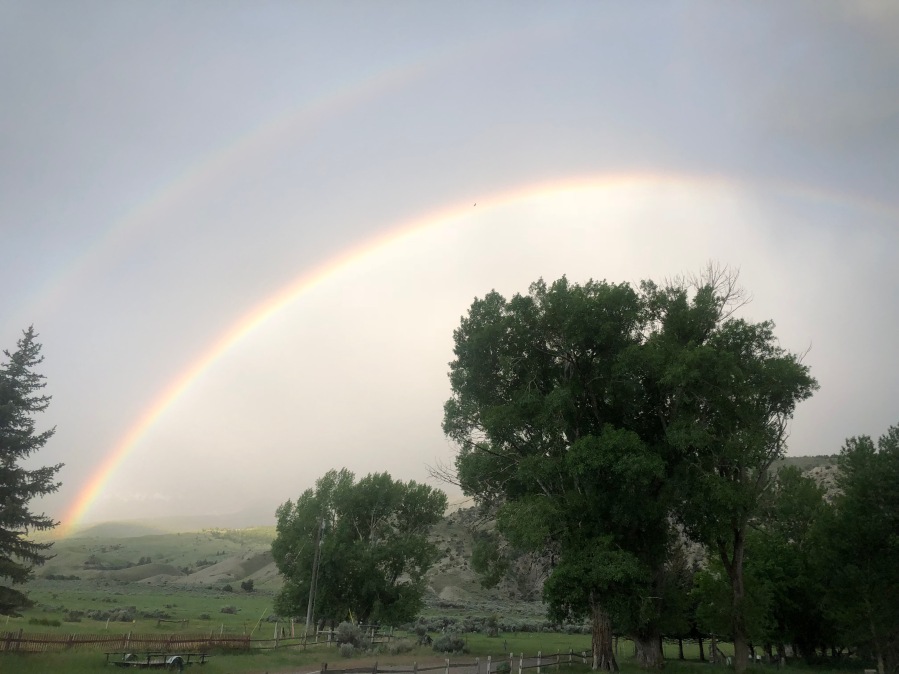 Scouting trails, spring season, hiking, Yellowstone, gratitude, yoga, connections, compassion, national parks…. Words and vague ideas float through my brain as I drink tea, look out the window, watching low clouds lift and fall, revealing then concealing the jagged summit of Electric Peak. I sit with the computer in lap, warming my thighs on this chilly mid June morning. Fred’s fire begins to send heat into the room, as I consider ideas. Rarely do we have full days of rain and clouds. This four-day streak is, thankfully, unusual. (Though I don’t complain as it keeps the land green and slows the relentless rush of water to river to sea.)
Scouting trails, spring season, hiking, Yellowstone, gratitude, yoga, connections, compassion, national parks…. Words and vague ideas float through my brain as I drink tea, look out the window, watching low clouds lift and fall, revealing then concealing the jagged summit of Electric Peak. I sit with the computer in lap, warming my thighs on this chilly mid June morning. Fred’s fire begins to send heat into the room, as I consider ideas. Rarely do we have full days of rain and clouds. This four-day streak is, thankfully, unusual. (Though I don’t complain as it keeps the land green and slows the relentless rush of water to river to sea.)
National parks. Those two words conjure up first mental images of beauty and wildness, then the words ‘America’s best idea’ slide into my conscious. So, to the web I go, searching for Wallace Stegner’s quote, one I’ve used before, one that sometimes raises my emotions, causing me to pause and gulp before I can complete reading the words aloud.
And with that small action, I am in love. Wallace Stegner was a genius with words. But I can’t tell you. Let me show you.
Here:
“National parks are the best idea we ever had. Absolutely American, absolutely democratic, they reflect us at our best rather than our worst.”
Read those words aloud. Yes, national parks are our best idea. His words give me hope as I strive to keep the fires of faith burning in the darkness of today’s politics.
His observation below introduces the Wilderness Act of 1964:
“Something will have gone out of us as a people if we ever let the remaining wilderness be destroyed; if we permit the last virgin forests to be turned into comic books and plastic cigarette cases; if we drive the few remaining members of the wild species into zoos or to extinction; if we pollute the last clear air and dirty the last clean streams and push our paved roads through the last of the silence . . .”
During his campaign for California governor, Ronald Reagan said: “….you know, a tree is a tree. How many more do you need to look at?” Perhaps Stegner wrote the following passage in response to Reagan’s attitude. While the first sentence is a repeat, this paragraph goes more deeply into our need for wild country.:
“Something will have gone out of us as a people if we ever let the remaining wilderness be destroyed. We need wilderness preserved — as much of it as is still left, and as many kinds — because it was the challenge against which our character as a people was formed We simply need that wild country available to us, even if we never do more than drive to its edge and look in. For it can be a means of reassuring ourselves of our sanity as creatures, a part of the geography of hope.”
If we wonder how so many in today’s world can be so callous to our human need for wilderness, Stegner has the sad answer. Consider his words:
“Whatever landscape a child is exposed to early on, that will be the sort of gauze through which he or she will see all the world afterwards.”
What lens will today’s children use to see the world? The haze of malls, theaters and classrooms with manufactured outdoor areas like playgrounds? The recent success of the book ‘Last Child in the Woods’ by Richard Louv chills me, as its very popularity points to the seriousness of nature deficit disorder (a newly coined term terrifying for its accuracy) not only in today’s children, but in today’s teachers as well.
I, for one, am glad for apple trees to climb, orchards through which to run, and fields to wander. My world-view gauze includes those childhood moments of freedom in the natural world, and has expanded with each outdoor experience. Wilderness is how I define myself. I wish and hope for the gauze of the joy of wildness and the importance of public lands to fall over today’s children, to enliven them with beauty and understanding of our connection to the robin, the wolf, the deer, even to the dandelion.
 Wallace Stegner says it so much better than I am able:
Wallace Stegner says it so much better than I am able:
“What is such a resource worth? Anything it costs. If we never hike it or step into its shade, if we only drive by occasionally and see the textures of green mountainside change under wind and sun, or the fog move soft feathers down the gulches, or the last sunset on the continent redden the sky beyond the ridge, we have our money’s worth. We have been too efficient at destruction; we have left our souls too little space to breathe in. Every green natural place we save saves a fragment of our sanity and gives us a little more hope that we have a future.”
Wallace Stegner has given me my geography of hope . Today’s wish for you, dear reader, is to feel the hope and to act upon that hope–to get out there and hike and fish and mess around with your friends… to sit quietly a while and contemplate that precious stillness within. And to take that hope, mold it into strength and determination.


I love this. I raised my kids camping, and hiking, and they are lovers of the outdoors still. We NEED wilderness, I know I do. Cities hold nothing for me. I’m pretty certain the current POTUS has never been to a forest, nor seen a tree outside a city park. The blatant disregard for wild places, proves just that.
LikeLiked by 1 person
Thanks for your comment, Mary. We are on the same page about wilderness. Wish we could get the present president into a NOLS month long course!
LikeLike
Wallace said it so well as have you. thanks Julianne. Wilderness can be many things in today’s world, found in places never or rarely visited, but also, I think, its essence can be found in more populated places. Familiarity with wilderness in its raw form may help us to recognize it in places where it may be less anticipated.
LikeLiked by 1 person
Thanks, Ken. And you are so right about wilderness being in many places and many things… thinking of one of my previous posts about Inner Wildness..
LikeLike
Maybe I’m just tired, but Stegner’s writing and yours brought tears into my eyes. By the time I finished this piece and read the comments, I had to wipe my cheeks and blow my nose. The hope isn’t there just now, Julianne. Only the sadness. I’m in mourning. I grieve for the children of the future, as well as those breathing right now. I’ll try reading this again, when I’m rested and perhaps more ready to be inspired with hope. I reach for a tissue.
LikeLiked by 1 person
Neysa: I understand about these words bringing tears to your eyes and I don’t think it’s because you are tired. Those of us who care deeply and are passionate about what we love–public lands– have shed many tears recently. I embarrass myself every time I read a quote to my Yellowstone groups and choke up. While it embarrasses me, my people appreciate it and it moves them, too. We can grieve and we can fight at the same time.
LikeLike
This is beautifully written once again Julianne. As I sat here reading it, I must admit to breaking down into tears. I too can relate to wilderness, having grown up in an environment of camping, fishing, walking in the woods, etc. I fear for the children growing up today, not being in touch with wilderness and I am profoundly saddened by what is becoming of our country. Perhaps some of my melancholy is due to missing Yellowstone this summer and all the friends we will not see this year. Thank you for the Stegner quotes. He couldn’t have said it any better.
LikeLike
If we are so hardened by the bad that is around us that we cannot be moved by words of love for the wild, then we are indeed impoverished. You, LuAnn, are a great heart. We are missing you this summer.
LikeLiked by 1 person
Thank you my friend. I long for Yellowstone, the vast open spaces, the perfect blending of wildlife that walks within her shadows, the eagles soaring overhead. I have been revisiting my photos from last summer, contenting myself with my memories as my therapist continues to torture me. I miss you all this summer and hope you have a spectacular summer.
LikeLiked by 1 person
Thank you for this. As a grandparent to two small children my top priority is to make sure they grow up seeing life through the gauze of wild places. Nature deficit disorder is real!
LikeLike
Hello, Karen. Thank you for caring and helping to create a new generation of outdoor-lovers. You and your actions give me hope.
By the way, I read that you are part way thru the PCT. I hiked 2010–SoCal, OR and WA, skipped Sierras and NoCal due to snow and health issues. Re-hiked part of Sierras and climbed Whitney and finished thru the JMT in 2013. Next year, hoping/planning to finish NoCal. Good luck in your efforts.
Another PS: One of my previous posts is about friends who say yes to adventure! We seem to have a few things in common!
LikeLiked by 1 person
Yes! to friends who say yes to adventure! I’ll be back on the PCT next spring (ACL surgery keeps me off this year) and still have some to do in NoCal too. Wildfire smoke has got in the way the past two times I was heading there. Good luck to you too!
LikeLiked by 1 person
More things in common: Sorry about the ACL issue. I came off the PCT in 2010 and got my first knee replacement, then got the second in 2013. I so understand the knee issues. I hope your aACL heals quickly and smoothly. Happy physical therapizing.
LikeLiked by 1 person
Thanks for reconnecting me with Wallace Stegner, a favorite writer with a rare connection to the wonders and immensity of Nature.
LikeLike
You are most welcome, Tio. Hope you are well.
LikeLike
Thank you for this wilderness inspiration from Wallace Stegner, my soul so needed it today.
LikeLike
I thought of you folks when listening to George Monbiot’s TED Talk on “RE-Wilding the Word.” May I offer the link for your enjoyment-
LikeLike